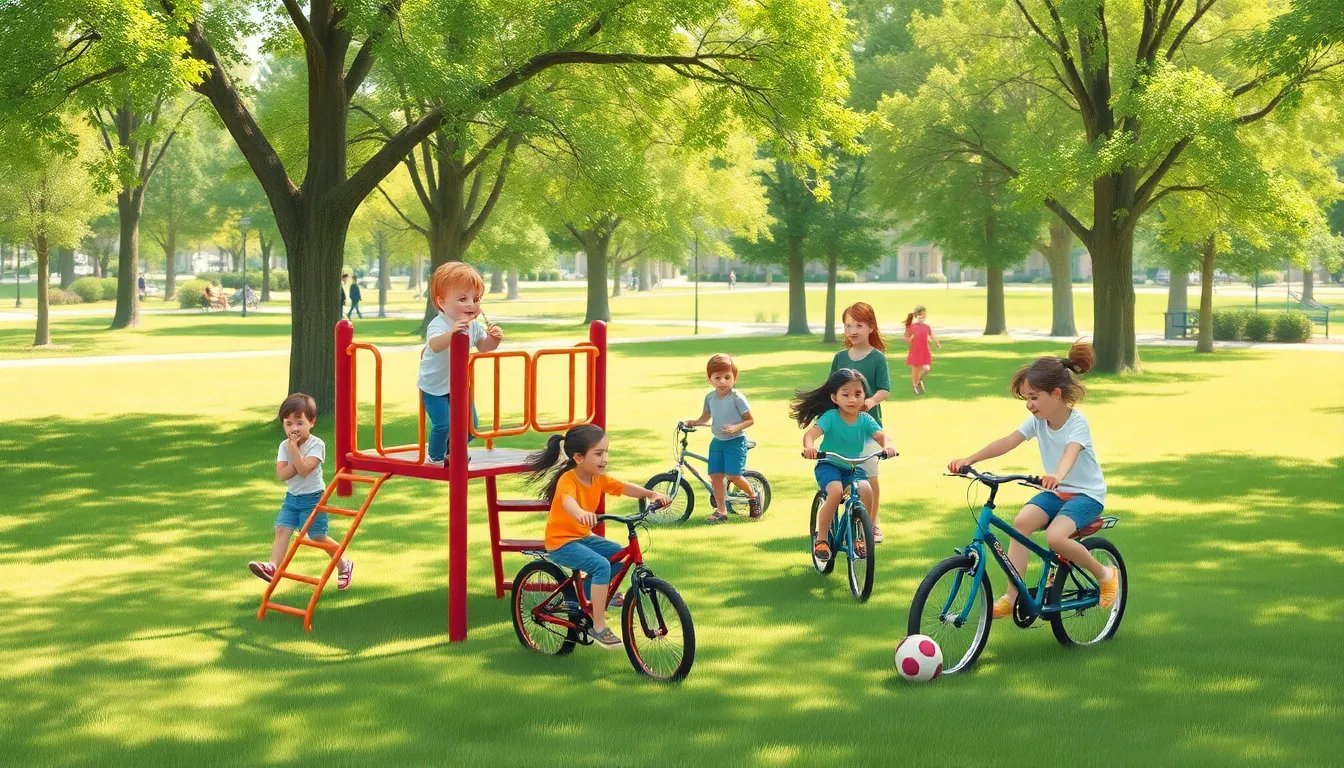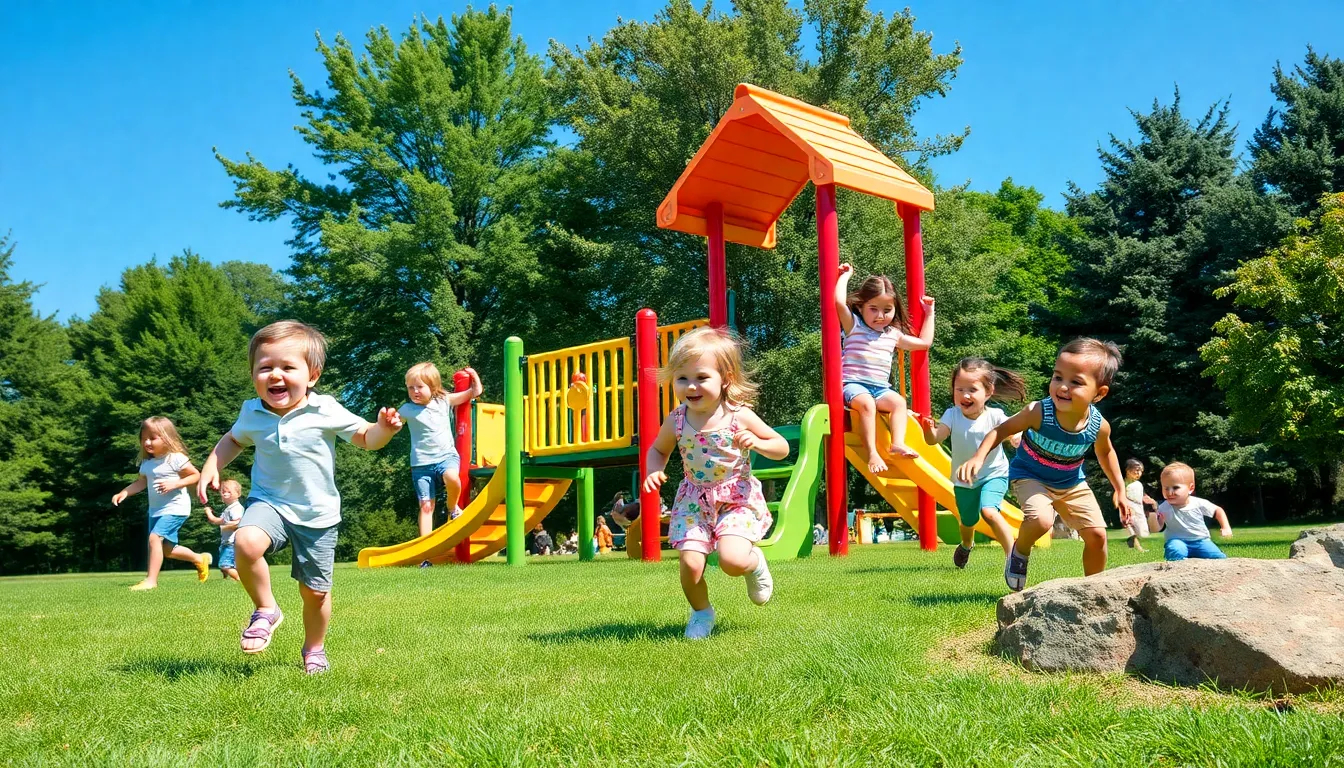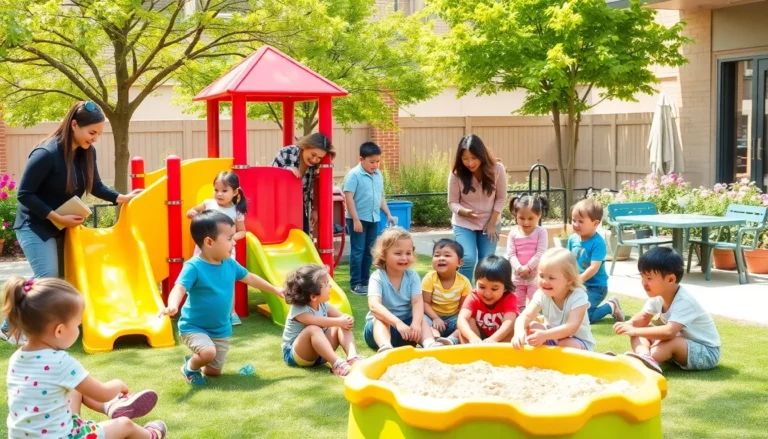Imagine a world where toddlers trade their tablets for tree branches and playgrounds become their personal jungles. Outdoor play isn’t just a fun escape; it’s a crucial building block for early childhood development. From boosting creativity to enhancing social skills, the benefits of playing outside are as vast as the sky on a sunny day.
Kids need fresh air and freedom to explore, and the great outdoors offers the perfect stage for them to unleash their imaginations. Whether it’s climbing, running, or simply rolling in the grass, each moment spent outside contributes to their physical, emotional, and cognitive growth. So, let’s dive into the delightful world of outdoor play and discover why it’s the secret ingredient to raising happy, healthy little adventurers.
Table of Contents
ToggleBenefits of Outdoor Play in Early Childhood
Outdoor play significantly enhances children’s physical health. Engaging in activities like running, jumping, and climbing helps develop motor skills and overall fitness. Children become less prone to obesity as they engage in active play.
Social skills also flourish during outdoor play. Kids learn to cooperate, negotiate, and communicate while playing games with peers. These interactions foster friendships and enhance emotional intelligence.
Cognitive development thrives in outdoor environments. Natural settings stimulate curiosity, prompting exploration and discovery. Problem-solving skills improve as children navigate obstacles and challenges in their surroundings.
Emotional well-being benefits immensely from outdoor activities. Exposure to nature lowers stress levels and promotes relaxation. Children express themselves freely and build resilience through outdoor play experiences.
Creativity shines when kids interact with nature. Imaginative play, such as building forts or pretending to be animals, encourages innovative thinking. Outdoor environments offer endless opportunities for unstructured play and creative exploration.
The importance of sensory experiences cannot be overstated. Natural outdoor settings provide diverse sights, sounds, and textures. These sensory interactions enhance children’s understanding of the world and enrich their learning.
Regular outdoor play establishes lifelong habits. Children develop a love for nature and physical activity that often continues into adulthood. Encouraging outdoor play from an early age instills values of health and wellness.
Prioritizing outdoor play in early childhood settings strengthens overall development. Creating ample opportunities for children to explore the outdoors enhances their growth. Parents and educators play a vital role in ensuring children reap these benefits through regular outdoor activities.
Physical Development

Outdoor play significantly enhances physical development in early childhood. Engaging in various activities outdoors fosters the growth of essential motor skills and promotes overall health.
Motor Skills
Developing motor skills occurs naturally through outdoor experiences. Children climb, run, and jump, which strengthens coordination and balance. Various activities, such as riding bikes or playing ball games, refine both gross and fine motor skills. These skills enable children to perform everyday tasks with greater ease and confidence. Regular practice in outdoor settings allows for improvement in movement patterns, contributing to better athletic abilities.
Overall Health
Regular outdoor play supports overall health in young children. Increased physical activity helps maintain a healthy weight, combating childhood obesity rates, which have reached alarming levels. Vitamin D absorption from sunlight boosts bone health and enhances mood, creating happier, more energetic children. Fresh air and outdoor environments reduce the risk of respiratory issues, promoting a stronger immune system. Prioritizing outdoor activities plays a crucial role in establishing lifelong habits of fitness and wellness.
Social Development
Outdoor play significantly contributes to children’s social development during early childhood. Engaging with peers in natural settings fosters crucial skills like teamwork and effective communication.
Teamwork and Collaboration
Through group activities like playing tag or building forts, children learn the importance of teamwork. They discover how to share responsibilities and take turns, reinforcing collaborative skills. Participation in outdoor games often requires players to strategize together, enhancing their ability to work as a unit. Developing a sense of belonging within a group makes friendships stronger. These social interactions pave the way for lasting relationships that extend beyond childhood.
Communication Skills
Outdoor play encourages children to express themselves and articulate ideas. Conversations emerge naturally as kids negotiate rules and share thoughts during playtime. Verbal interactions promote the clarity of speech and widen vocabulary. Interaction with different peers sharpens their listening skills and teaches them to consider others’ viewpoints. Engaging in this communicative environment lays the foundation for future relationships and social dynamics.
Cognitive Development
Outdoor play significantly enhances cognitive development in children. Engaging with nature stimulates creative thinking and imaginative play.
Creativity and Imagination
Children often find inspiration in outdoor environments. Exploring natural settings encourages them to invent scenarios and role-play. Activities like building forts from sticks or creating art with leaves unleash their creativity. Engaging with diverse textures, sounds, and sights fosters unique ideas. Nature-based play expands their ability to think outside the box. Whether climbing trees or gathering stones, kids develop their imaginative skills and gain confidence in expressing themselves.
Problem-Solving Skills
Outdoor play naturally presents challenges. As children navigate obstacles like climbing structures or finding their way through a maze, they enhance their problem-solving abilities. They learn to assess risks and make decisions on the spot. Situations like negotiating with peers or resolving disputes over equipment sharpen their critical thinking skills. Each outdoor adventure offers new scenarios that stimulate their intellect. The exposure to unpredictable environments fosters adaptability, enhancing their ability to approach problems creatively and effectively.
Emotional Development
Outdoor play significantly impacts emotional development in young children. Engaging with the natural world allows kids to express their feelings and manage their emotions more effectively.
Self-Regulation
Self-regulation skills develop as children navigate outdoor environments. Encountering challenges during play provides opportunities to practice patience and perseverance. Outdoor settings often present unpredictable elements, teaching kids to adapt their reactions. Experiencing excitement and disappointment during playtime helps children learn to control impulses and moderate emotional responses. Activities like climbing trees or balancing on logs require focus, which enhances attention span and emotional regulation.
Confidence Building
Confidence builds as children explore and master new skills outdoors. Achieving physical challenges, like swinging from monkey bars or completing obstacle courses, fosters a sense of accomplishment. Positive reinforcement during play can boost self-esteem, encouraging children to take on new tasks. Social interactions with peers in diverse outdoor settings help kids develop assertiveness and independence. Engaging in cooperative play cultivates decision-making skills, reinforcing their belief in their own abilities. Overall, outdoor play nurtures a strong foundation for emotional well-being, supporting resilience and self-confidence.
Embracing outdoor play in early childhood is essential for nurturing well-rounded development. It fosters physical health social skills cognitive growth and emotional resilience. By encouraging children to explore nature they gain invaluable experiences that shape their understanding of the world.
Parents and educators play a pivotal role in facilitating these outdoor experiences. Prioritizing time spent outside not only supports children’s current growth but also lays the groundwork for lifelong habits of fitness and wellness. Investing in outdoor play is investing in a child’s future.




